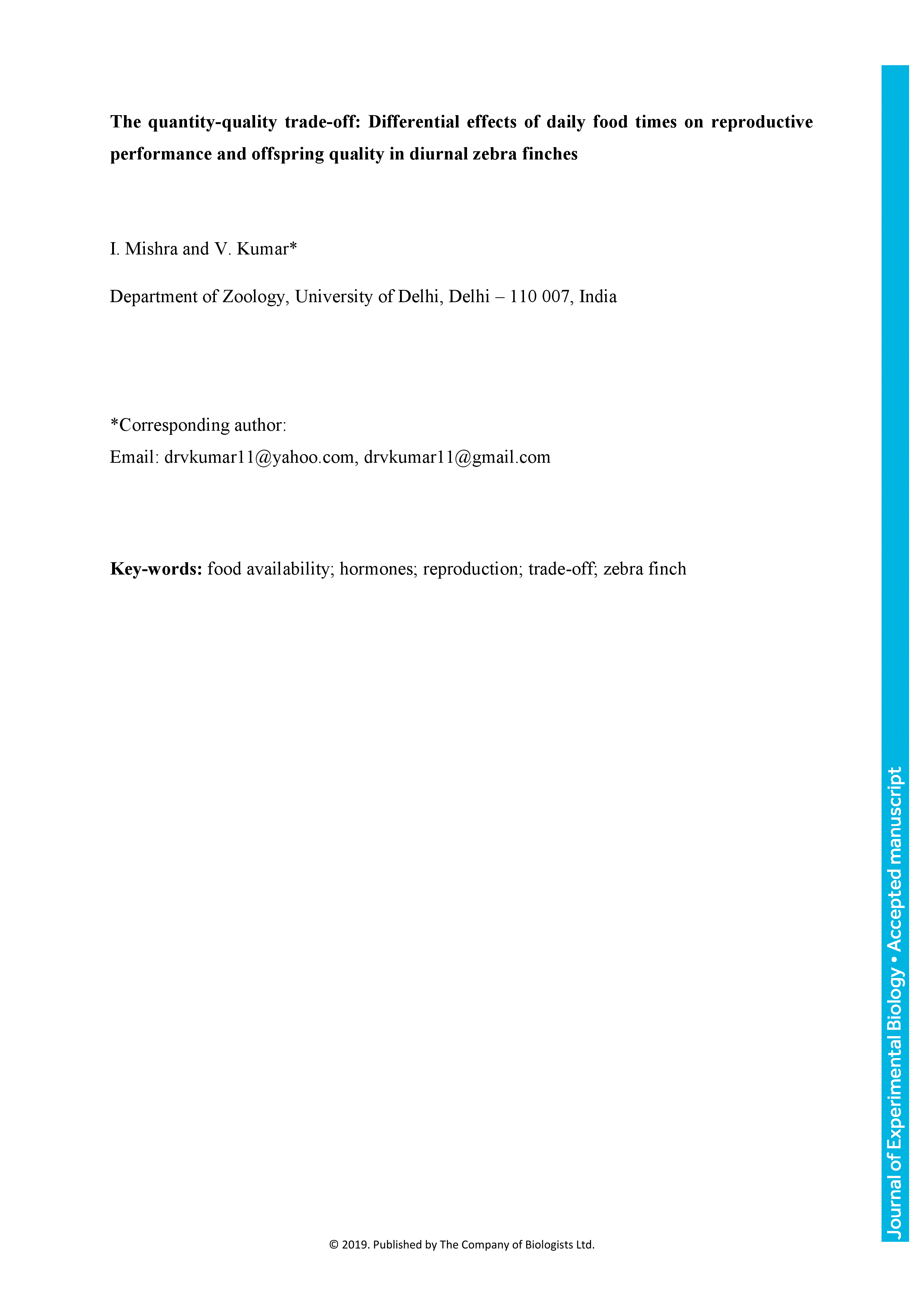Abundant food supply is crucial to reproductive performance, as shown by restricted food availability experiments, in small-sized vertebrates including birds. However, whether daily times of feeding would affect the reproduction is largely unknown. Present study investigated the effects of daily food availability times on reproductive performance and quality of eggs and offspring survivors in zebra finches (Taeniopygia guttata). To randomly paired birds kept under 12 h light per day for about 52 weeks, food availability period was restricted to 4 h in morning (FA-M) or evening (FA-E), with controls on food ad libitum; thus, daily food deprivation period began after 4 h of food in FA-M and was continuous with nighttime starvation in FA-E. Both food restrictions adversely affected reproductive health as shown by reduced sex steroids and mesotocin levels, but not general metabolism as indicated by no-difference in thyroxin and triiodothyronine levels. Food for 4 h negatively affected the reproductive performance, although with differences between FA-M and FA-E pairs. Particularly, there was delayed onset of reproduction and compromised reproductive success in FA-E, but not in FA-M pairs; conversely, the offspring health was severely compromised in FA-M, but not in FA-E pairs. Furthermore, FA-M females were in better health, implicating sex-biasness in parental food provisioning. Overall, we demonstrate trade-off of ‘quantity’ (offspring produced and/ or survived) for ‘quality’ (how good offspring were in health) in response to daily food availability times in zebra finches that much like humans are diurnal and retain the ability to reproduce throughout the year.
The quantity-quality trade-off: differential effects of daily food times on reproductive performance and offspring quality in diurnal zebra finches
Currently Viewing Accepted Manuscript - Newer Version Available
- Split-screen
- Views Icon Views
- Open the PDF for in another window
-
Article Versions Icon
Versions
- Version of Record 03 April 2019
- Accepted Manuscript 01 January 2019
- Share Icon Share
-
Tools Icon
Tools
- Search Site
I. Mishra, V. Kumar; The quantity-quality trade-off: differential effects of daily food times on reproductive performance and offspring quality in diurnal zebra finches. J Exp Biol 2019; jeb.196667. doi: https://doi.org/10.1242/jeb.196667
Download citation file:
Advertisement
2023 JEB Outstanding Paper Prize shortlist and winner

The JEB Editors are delighted to announce the shortlisted authors for the 2023 JEB Outstanding Paper Prize. Read the winning paper - Tiny spies: mosquito antennae are sensitive sensors for eavesdropping on frog calls - by Hoover Pantoja-Sanchez and Brian Leavell from Ximena Bernal's lab at Purdue University, USA.
JEB Science Communication Workshop for ECRs

If you’re an early-career researcher interested in science communication and are attending the SEB Annual Conference in Prague this summer, come a day early and join the JEB Editors at a sci comm workshop to learn the key writing skills needed to promote your research to a broad audience beyond your peers (1 July at 14.30-17.30). Places are limited to 24 attendees, and applicants should apply through the SEB registration page by 30 April 2024.
Bridging the gap between controlled conditions and natural habitats in understanding behaviour

Novel technologies enable behavioural experiments with non-model species, in naturalistic habitats and with underexplored behaviours. In their Commentary, Scholz and colleagues discuss how to obtain a deeper understanding of the natural ecology and lifestyle of study animals.
Beluga metabolic measures could help save species

To help save animals from extinction, it’s important to understand what each species needs to survive. This led Jason John et al. to measure the metabolic rates of captive belugas to develop a ‘fish calculator’ showing that the whales need to eat ~23 salmon per day.
ECR Workshop on Positive Peer Review

Are you an ECR looking for tips on how to write concise, astute and useful manuscript reviews? If so, join the JEB Editors at a 2-hour JEB-sponsored Workshop on Positive Peer Review at the Canadian Society of Zoologists annual meeting in Moncton on 9 May 2024 at 13.00-15.00. There are 25 spaces for ECRs and selection is first come, first serve. To sign up, check the ECR Workshop box when you register for the CSZ meeting.



